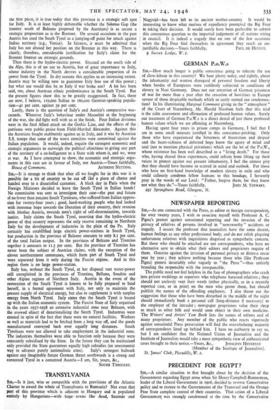Sm,—It is strange to think that after all we fought
for in this war it is possible for a bit of country to be cut off like a piece of cheese and handed over to a dissatisfied customer. A black day in -Paris when the Foreign Ministers decided to leave the South Tyrol in Italian hands! No commission was sent to investigate their case—the past and future of no fewer than 200,000 South Tyroleans, who suffered from Italian oppres- sion for twenty-four years ; good, hard-working people who had looked with immense hope towards-the liberation of their country, their reunion with Mother Austria, towards men's right of self-determination, towards justice. Italy claims the South Tyrol, asserting that the hydro-electric power of that country represents the only reserve remaining to Northern Italy for- the development of industries in the plain of the Po. Italy certainly has established large electric power-stations in South Tyrol, but production in the province of Bolzano amounts to only 8.1 per cent. of the total Italian output. In the provinces of Bolzano and Trentino together it amounts to 11.5 per cent. But the province of Trentino has never been the subject of Austrian claims, with the exception of the eleven northernmost communes, which form part of South Tyrol and were _separated from it only during the Fascist regime. And in this region there is no large power-station.
Italy has, without the South Tyrol, at her disposal vast water-power still unexploited in the provinces of Trentino, Belluno, Sondrio and other Alpine regions of Northern Italy. Austria in the event of the restoration of the South Tyrol is known to be fully prepared to bind herself, in a formal agreement with Italy, not only to maintain the present supply of electrical energy, but also to supplement it with surplus energy from North Tyrol. Italy states that the South Tyrol is bound up with the Italian economic system. The Fascist State of Italy organised in the years 1937-1938 an extensive industrial zone near Bolzano, with the avowed object of denationalising the South Tyrol. Industries were created in spite of the fact that there were no natural facilities. Workers as well as materials had to be fetched from a long way off, and the goods manufactured conveyed back over equally long distances. South Tyroleans were not allowed to take employment, in the industrial zone. The industries themselves were able to function only because they were constantly subsidised by the State. In the future they can be maintained only provided the State guarantees equally high subsidies (an uneconomic way to advance purely nationalistic aims). Italy's strongest bulwark against any imaginable future German thrust southwards is a strong and contented Tyrol in a contented Austria.—I am, Sir, yours, &c., SOUTH TYROLEAN.


























 Previous page
Previous page